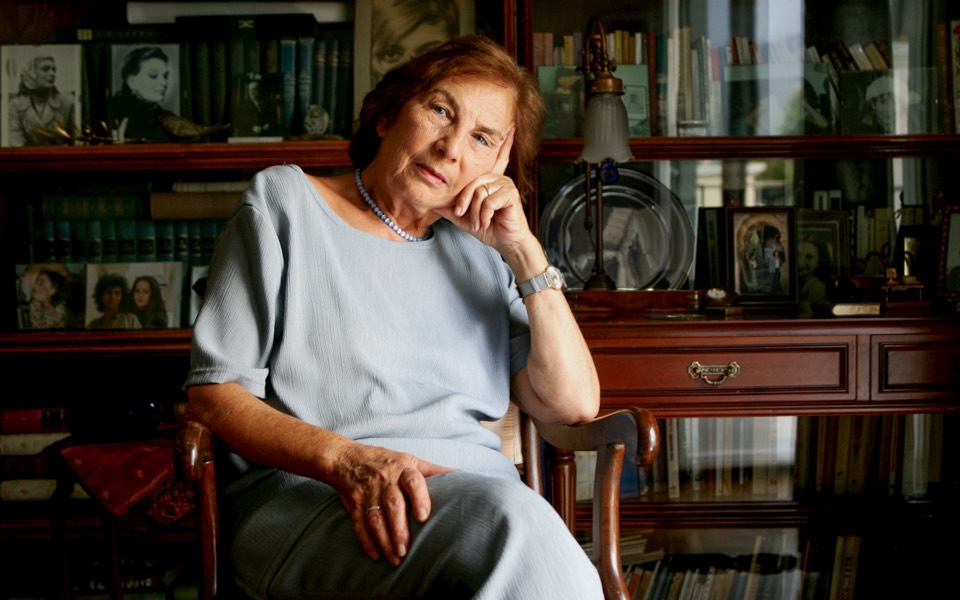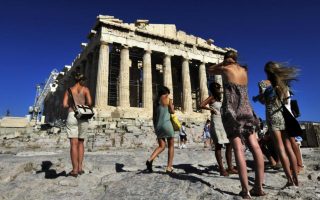The end of an era

The death in February of Greek writer Alki Zei, at the age of 97, closes not only a life of distinguished authorship but also a period of Greek history which is about to come under review. With the bicentenary of the War of Independence next year, and the centenary of the Anatolian Catastrophe in 2022, Zei’s lifetime embraces many cardinal points of modern history.
The fact that Turkey is itself due to celebrate the centenary of the modern republic in 2023 is a salutary reminder that the entire region owes its political status to the events from 1912 (the First Balkan War) to 1923.
Zei grew up partly on the island of Samos, where her mother was from and where many of the Anatolian refugees found shelter. Today, it is the tragic site of confrontation between Greek citizens and their own security forces, as this new catastrophe emanating from Anatolia unfolds.
Acclaimed for her classic semi-autobiographical novel “Achilles’ Fiancee” (1987), Zei personified what Neni Panourgia has called “dangerous citizens” – those whose quest for freedom pushed them to the margins of society. As a consequence, Zei lived in what was then the USSR, before returning to Greece in 1964. The advent of the junta in 1967 sent her away again, to Paris.
Zei, as a committed socialist, had no place in post-war Greece, when many on the Left were condemned to internal exile in prison camps on the islands. The Greek government’s desperate measures today, in building detention centers for refugees, echo that strategy of exclusion. They will replicate the “Direct Provision” system for refugees and asylum seekers in Ireland over the past 20 years – a fixed point of blight on the landscape.
Ten years ago it was inconceivable that SYRIZA, a party with its historical roots in communism, could take power. Its success highlighted the poverty of statecraft within both New Democracy and PASOK, rather than any innate ideological merit, but it broke the cozy mold of Greek politics. Today, SYRIZA is publicly licking its wounds after its failure to solve not only the economic and refugee crises but to heal the self-inflicted injuries of history. But Kyriakos Mitsotakis is no better fitted to take on that role: He may contain and cover up the problems, but he cannot eradicate them. He, too, is a prisoner of history. As Zei’s novel tells us, “We can’t forget the old days; they’re our whole life.”
“Achilles’ Fiancee” depicts the self-discovery of a young woman on a trajectory very similar to Zei’s own through the years 1940 to 1981, questioning, and rejecting, labels of identity. In tearing apart the political themes of the Greek resistance to the Nazis, the civil war and the junta, the novel also exposes the tensions and torsions of modern Greece, which are the legacy of its history. In a country about to celebrate the bicentenary of its independence, the emotional and ethical canvas is spattered with the consciences of resistance and dissidence.
Today we have a civil crisis where Greek police shoot tear gas and stun grenades at their fellow citizens on the eastern islands. But this has to be seen parallel to the grievous damage done daily to the quality of life throughout Greece, to the old and those young people who are still here, which are also predicted in Zei’s work.
Many Greeks take heart from the fact that the former head of the supreme court, Katerina Sakellaropoulou, was made president this year. She joins a number of women who, like Zei, are distinguished for their unrelenting honesty, clarity and wisdom: women of the caliber of novelists Eugenia Fakinou, Maro Douka and Ioanna Karystiani (herself a potential candidate for the presidency in 2015).
But as titular head of state Sakellaropoulou will preside over a country where a public prosecutor can describe a former minister of justice as “the definition of lawlessness”; where the “brain drain” generation is all but irreversible; where young people pay 60 percent of their income in rent; where incentives for foreign investment are frequently stalled by bureaucratic procedures; where the single greatest asset, the tourist industry, is chaotic; a country, even, which allows the systematic eradication of the traditional fishing vessel, the caique, on foot of a European Union directive.
In recent years the grandchildren of the Anatolian refugees, empathizing with the experience of the new seekers of asylum from war and terror, welcomed the arrivals. A greater example of humanitarian compassion can hardly be imagined. If “xenos” means both “stranger” and “guest,” then that hospitality is both a challenge and a responsibility. Xenophilia is far stronger than xenophobia, but these days Greece has become xenophobic toward its own people – strangers to themselves.
Zei and her fellow-travelers of the Left often lost their way because, as in today’s economic, political and bureaucratic crises, the train is constantly shunted into a siding for repairs, or to avoid insuperable obstacles on the line ahead, or simply to check if the wheels are still going round. Or, as in the case of TrainOSE, sold to foreigners. As Zei’s central character asks, “How many times have we said we’ll start all over again?”
Richard Pine is director of the Durrell Library of Corfu, which will host “Borders and Borderlands” on May 20-24.





